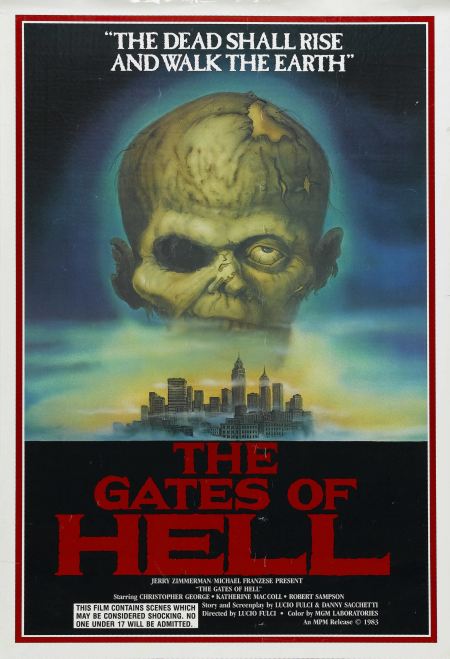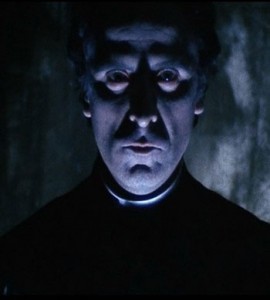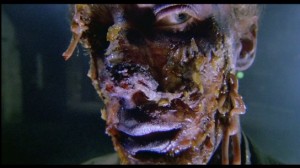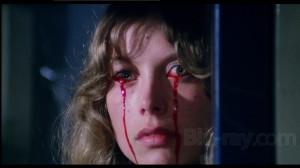 CEMETERY MAN (1994); Dir. Michele Soavi; Starring Rupert Everett, Anna Falchi and François Hadji-Lazaro; Tuesday, February 18 @ 9:30 p.m. (photos and merch table open @ 9:00 p.m.); Plaza Theatre; Trailer here.
CEMETERY MAN (1994); Dir. Michele Soavi; Starring Rupert Everett, Anna Falchi and François Hadji-Lazaro; Tuesday, February 18 @ 9:30 p.m. (photos and merch table open @ 9:00 p.m.); Plaza Theatre; Trailer here.
By Aleck Bennett
Contributing Writer
Bringing classic gore flicks back to life is the mission of Splatter Cinema, and this Tuesday’s engagement at the Plaza Theatre is a special one indeed: Michele Soavi’s brilliant CEMETERY MAN!
Along with his compatriot, Lamberto Bava (son of the legendary filmmaker Mario Bava), director Michele Soavi breathed a bit of life into the twitching corpse of the Italian horror renaissance kicked off by Dario Argento and Lucio Fulci. Both worked under Argento as assistant/second unit directors, while Soavi took on acting roles in a number of Italian horror films as well (that’s him as the metal-faced mystery guy in DEMONS and as the boyfriend forced to watch his girlfriend puke up her intestines in CITY OF THE LIVING DEAD). And while Bava’s films typically went for the blunt, straight-ahead shocks of DEMONS and gialli like DELIRIUM, Soavi typically gravitated toward the surrealistic and fantastic elements of SUSPIRIA and THE BEYOND. 1989’s THE CHURCH and 1991’s THE SECT—both made under the auspices of Dario Argento’s production—both showed the kind of promise that he held as a filmmaker, but were hindered by scripts that drew too freely from highly influential works (THE CHURCH hews closely to Argento’s SUSPIRIA and INFERNO, while THE SECT is ROSEMARY’S BABY redux).
But once out from under his mentor’s wing, Soavi soared with perhaps the last great film of the Italian new wave of horror, CEMETERY MAN (released in Italy with the much better title, DELLAMORTE DELLAMORE, a pun on the main character’s name which translates as either “about death and about love” or “about the death of love”).
 Francesco Dellamorte is the caretaker of the Buffalora cemetery, assisted by his mentally handicapped assistant Gnaghi, who can only speak the syllable “gna.” Dellamorte’s humdrum life consists of maintaining the grounds, crossing out the names of the dead from phone books and killing the reanimated corpses that rise after seven days of interment…all of which he undertakes with the same bored stoicism. It’s a job, after all, and shooting the zombies is easier than going through the paperwork needed to get any help. When he becomes infatuated with a young widow and Gnaghi falls for the mayor’s daughter, however, things take a turn for the worse.
Francesco Dellamorte is the caretaker of the Buffalora cemetery, assisted by his mentally handicapped assistant Gnaghi, who can only speak the syllable “gna.” Dellamorte’s humdrum life consists of maintaining the grounds, crossing out the names of the dead from phone books and killing the reanimated corpses that rise after seven days of interment…all of which he undertakes with the same bored stoicism. It’s a job, after all, and shooting the zombies is easier than going through the paperwork needed to get any help. When he becomes infatuated with a young widow and Gnaghi falls for the mayor’s daughter, however, things take a turn for the worse.
Soavi’s film is full of delightfully dark comedy and the kind of atmosphere the Italian horror scene hadn’t witnessed in years, comparable to the best of Bava, Fulci and Argento. The tone and visuals not only echo the best of Italo-horror, but also the best of Terry Gilliam’s works—no surprise, as Gillaim devotee Soavi was second unit director on 1988’s THE ADVENTURES OF BARON MUNCHAUSEN and reportedly shot about a quarter of that film. Rupert Everett is especially effective as Dellamorte, bringing the right amount of pathos and longing to his dour role, while still delivering believable doses of sarcasm, wit and violence. And while the film isn’t quite as graphically violent as many of its Italian zombie counterparts, its effects (by maestro Sergio Stivaletti) are expertly pulled off.
It’s a rare film that can combine detailed character study, an exploration of the joys and pain of love and romance, rollicking comedy, explosive violence and the inevitable reanimation of the dead. But CEMETERY MAN is it. If just about anyone else tried to do it, it would likely come out as pretentious and scattershot, but Michele Soavi is the man who proved it could be done and done successfully.
Unfortunately for the Italian horror film scene and its fans, Soavi retired from feature film work after CEMETERY MAN to care for his ailing son, though he took on some television work in the years following. And while rumors of a return to horror have been suggested (with news of a potential sequel to CEMETERY MAN floated over the past two years), Soavi’s resurrection remains something the faithful still anticipate with bated breath.
Aleck Bennett is a writer, blogger, pug warden, pop culture enthusiast, raconteur and bon vivant from the greater Atlanta area. Visit his blog at doctorsardonicus.wordpress.com






